Prom 68, A Midsummer Night's Dream, Garsington Opera review - eerie beauty sometimes faintly glittering | reviews, news & interviews
Prom 68, A Midsummer Night's Dream, Garsington Opera review - eerie beauty sometimes faintly glittering
Prom 68, A Midsummer Night's Dream, Garsington Opera review - eerie beauty sometimes faintly glittering
Strong cast and top orchestra project as best they can in a fine company's first Proms visit
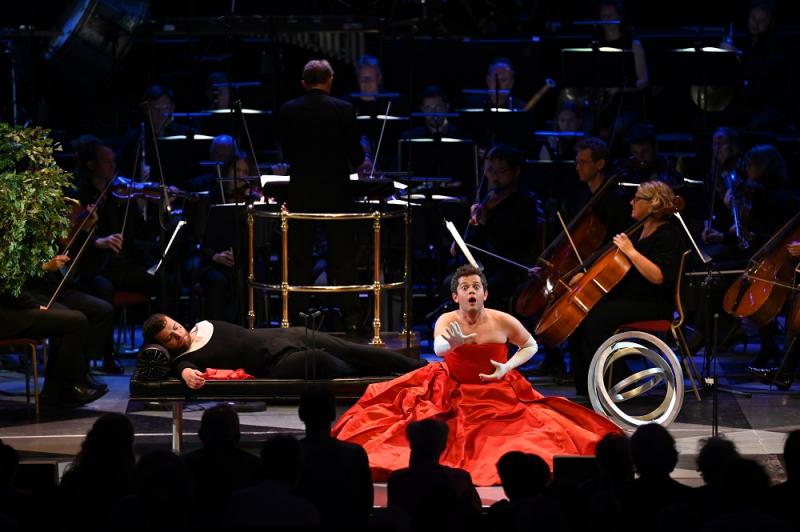
Some operas shine in the vasts of the Albert Hall, others seem to creep back into their beautiful shells. Glyndebourne’s Carmen blazed, though Bizet never intended his opera for a big theatre, while Britten’s A Midsummer Night’s Dream, despite an equally fine cast from what’s now an equally fine company, Garsington Opera, left us with some black holes in the iridescent spider-web.
That was no fault of Douglas Boyd’s pacing in a work which can take time to get going, with country miles of exposition, compressing crucial facts from Shakespeare's Acts One and Two, nor of his bewitching Philharmonia players. Indeed, while certain sounds are often noted – Puck’s acrobatic trumpet and drum, Bottom’s trombone, Oberon’s eerie celesta – it’s rare that one gets to realise how amazingly Britten meshes unexpected groups of players. What we hear from the opera-house pit often feels large in intention, but with reduced strings and brass – the opera played first in Aldeburgh’s Jubilee Hall – it’s all on a tight leash held by a master inventor of fresh and unexpected textures. Underneath it lie long-term harmonic arguments as rigorous as those in The Turn of the Screw; the more you get to know what Britten's up to, the greater the respect for genius at work. 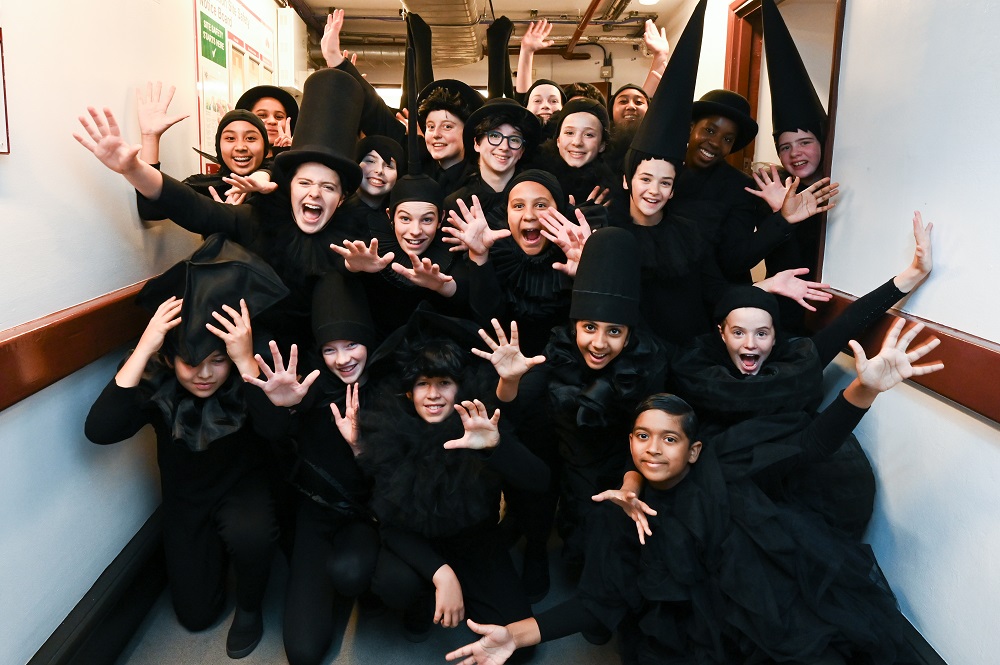 Boyd might have waited a bit longer for the audience to settle before those eerie glissandos of the living wood glimmered through the darkness, but once we got the ricochet of percussion to introduce the child fairies (the Garsington Youth Opera Company, superb throughout, pictured above backstage), the magic truly took over.
Boyd might have waited a bit longer for the audience to settle before those eerie glissandos of the living wood glimmered through the darkness, but once we got the ricochet of percussion to introduce the child fairies (the Garsington Youth Opera Company, superb throughout, pictured above backstage), the magic truly took over.
Iestyn Davies and Lucy Crowe always hold a stage, and worked this venue for luminous tone-colours, while the body language of Netia Jones’ direction for Oberon and Tytania – reimagined here by Rebecca Meltzer, though I missed the beauty of Jones’s projections – heightened the sense of dissension over the "little changeling boy”. This Fairy King and Queen (Davies and Crowe pictured below with Jerone Marsh-Reid's Puck and Daniel Vening's transformed Bottom) are never at rest in the battle of the sexes, which may have cued the all-too-briefly featured acridity between a drunk Theseus (Nicholas Crawley) and angry Hippolyta (Christine Rice, luxury casting), one of several production points that didn’t quite land. 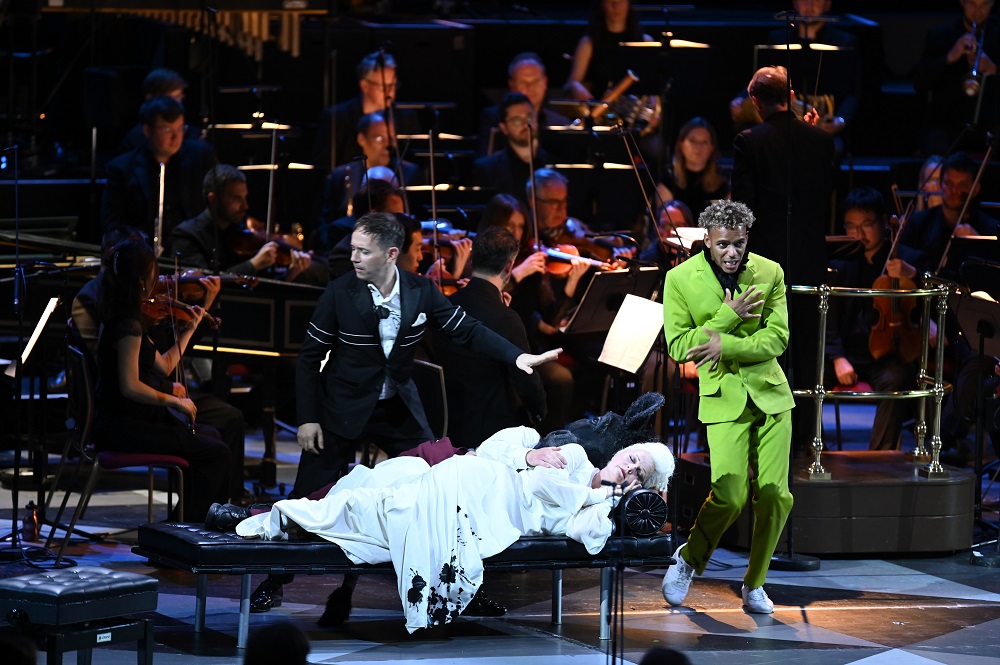 Given costumes to carry the burden, it seemed as if Jones’s concept was dominated by colour palettes, black versus white, without the overall cohesion to be found in Robert Carsen's much-travelled production. The lovers came hotfoot from the Athenian Academy, the boys not out of short trousers at first. The lower voices, baritone James Newby and mezzo Stephanie Wake-Edwards, carried better, but there was tonal beauty when you could catch if from tenor Casper Singh and soprano Camilla Harris.
Given costumes to carry the burden, it seemed as if Jones’s concept was dominated by colour palettes, black versus white, without the overall cohesion to be found in Robert Carsen's much-travelled production. The lovers came hotfoot from the Athenian Academy, the boys not out of short trousers at first. The lower voices, baritone James Newby and mezzo Stephanie Wake-Edwards, carried better, but there was tonal beauty when you could catch if from tenor Casper Singh and soprano Camilla Harris.
All four (pictured below waiting for the court entertainment) have bright futures ahead of them. The climactic Act Two spat was full of action, winning a round of applause in the hall as all four exited in confusion, co-ordination with the players just about holding. And the Act Three quartet was rightly incandescent. 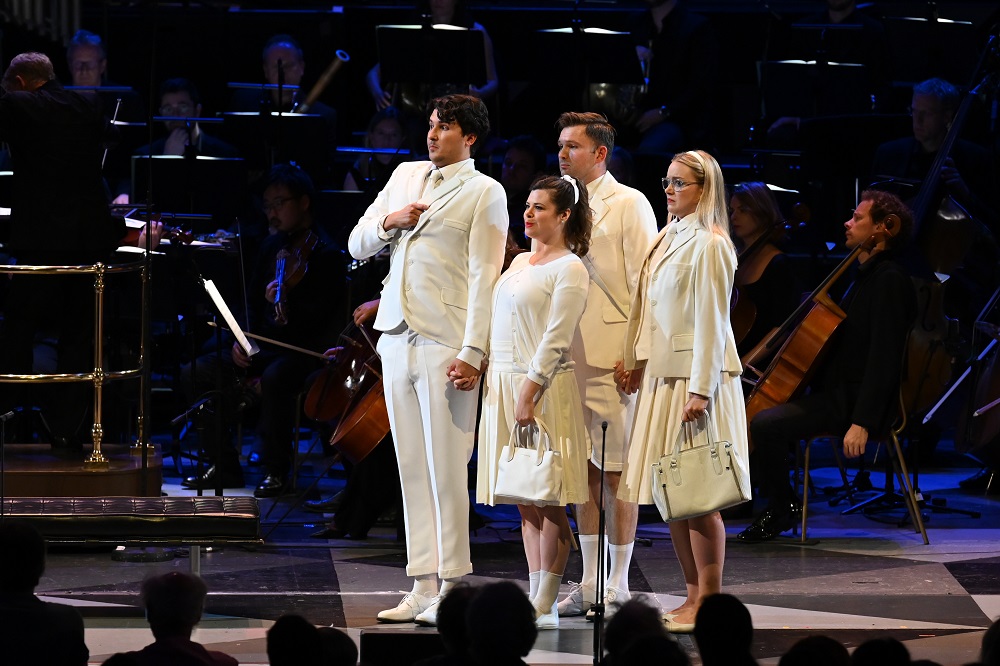 The ensemble of mechanicals might have been diminished a little by the indisposition of the original Bottom, Richard Burkhard; his place was taken by Daniel Vening, who played it straight (no slip inside my programme, where Burkhard was listed and biographied). Star of the show-within-a-play, as so often, was Flute/Thisbe, here progressing from tremulous "let not me play a woman" to indomitable queen in a bright-red ballgown; three cheers for the charismatic James Way, especially in his imperious 11 o'clock number.
The ensemble of mechanicals might have been diminished a little by the indisposition of the original Bottom, Richard Burkhard; his place was taken by Daniel Vening, who played it straight (no slip inside my programme, where Burkhard was listed and biographied). Star of the show-within-a-play, as so often, was Flute/Thisbe, here progressing from tremulous "let not me play a woman" to indomitable queen in a bright-red ballgown; three cheers for the charismatic James Way, especially in his imperious 11 o'clock number.
There were good visual gags for slow-of-study Snug (Frazer Scott), taking bites of banana and carrot between utterances, and a stiffly-plastered Wall (Adam Sullivan's Snout, pictured below with fellow mechanicals). John Savournin and Geoffrey Dolton got big laughs, too, for the cheesy music-hall routine they exercised for the Bergomask Dance. 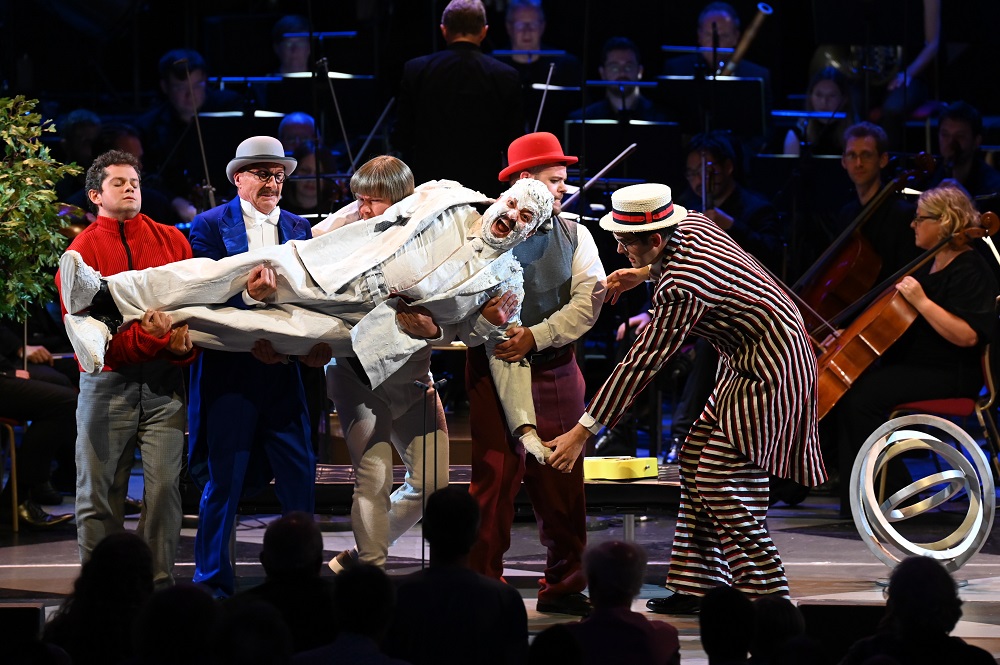 Then, midnight magic, and finally an encouragement to willing applause from Jerone Marsh-Reid's lime-green-suited Puck, suitably engaging and modestly acrobatic. The audience left smiling. From my place in the hall, it was a three-star experience, and I'd certainly want to see the production in its proper home, praying for a revival, but Garsington Opera deserves four for highest musical values on its Proms debut.
Then, midnight magic, and finally an encouragement to willing applause from Jerone Marsh-Reid's lime-green-suited Puck, suitably engaging and modestly acrobatic. The audience left smiling. From my place in the hall, it was a three-star experience, and I'd certainly want to see the production in its proper home, praying for a revival, but Garsington Opera deserves four for highest musical values on its Proms debut.
The future of Arts Journalism
You can stop theartsdesk.com closing!
We urgently need financing to survive. Our fundraising drive has thus far raised £49,000 but we need to reach £100,000 or we will be forced to close. Please contribute here: https://gofund.me/c3f6033d
And if you can forward this information to anyone who might assist, we’d be grateful.

Subscribe to theartsdesk.com
Thank you for continuing to read our work on theartsdesk.com. For unlimited access to every article in its entirety, including our archive of more than 15,000 pieces, we're asking for £5 per month or £40 per year. We feel it's a very good deal, and hope you do too.
To take a subscription now simply click here.
And if you're looking for that extra gift for a friend or family member, why not treat them to a theartsdesk.com gift subscription?
more Opera
 First Person: Kerem Hasan on the transformative experience of conducting Jake Heggie's 'Dead Man Walking'
English National Opera's production of a 21st century milestone has been a tough journey
First Person: Kerem Hasan on the transformative experience of conducting Jake Heggie's 'Dead Man Walking'
English National Opera's production of a 21st century milestone has been a tough journey
 Madama Butterfly, Irish National Opera review - visual and vocal wings, earthbound soul
Celine Byrne sings gorgeously but doesn’t round out a great operatic character study
Madama Butterfly, Irish National Opera review - visual and vocal wings, earthbound soul
Celine Byrne sings gorgeously but doesn’t round out a great operatic character study
 theartsdesk at Wexford Festival Opera 2025 - two strong productions, mostly fine casting, and a star is born
Four operas and an outstanding lunchtime recital in two days
theartsdesk at Wexford Festival Opera 2025 - two strong productions, mostly fine casting, and a star is born
Four operas and an outstanding lunchtime recital in two days
 The Railway Children, Glyndebourne review - right train, wrong station
Talent-loaded Mark-Anthony Turnage opera excursion heads down a mistaken track
The Railway Children, Glyndebourne review - right train, wrong station
Talent-loaded Mark-Anthony Turnage opera excursion heads down a mistaken track
 La bohème, Opera North review - still young at 32
Love and separation, ecstasy and heartbreak, in masterfully updated Puccini
La bohème, Opera North review - still young at 32
Love and separation, ecstasy and heartbreak, in masterfully updated Puccini
 Albert Herring, English National Opera review - a great comedy with depths fully realised
Britten’s delight was never made for the Coliseum, but it works on its first outing there
Albert Herring, English National Opera review - a great comedy with depths fully realised
Britten’s delight was never made for the Coliseum, but it works on its first outing there
 Carmen, English National Opera review - not quite dangerous
Hopes for Niamh O’Sullivan only partly fulfilled, though much good singing throughout
Carmen, English National Opera review - not quite dangerous
Hopes for Niamh O’Sullivan only partly fulfilled, though much good singing throughout
 Giustino, Linbury Theatre review - a stylish account of a slight opera
Gods, mortals and monsters do battle in Handel's charming drama
Giustino, Linbury Theatre review - a stylish account of a slight opera
Gods, mortals and monsters do battle in Handel's charming drama
 Susanna, Opera North review - hybrid staging of a Handel oratorio
Dance and signing complement outstanding singing in a story of virtue rewarded
Susanna, Opera North review - hybrid staging of a Handel oratorio
Dance and signing complement outstanding singing in a story of virtue rewarded
 Ariodante, Opéra Garnier, Paris review - a blast of Baroque beauty
A near-perfect night at the opera
Ariodante, Opéra Garnier, Paris review - a blast of Baroque beauty
A near-perfect night at the opera
 Cinderella/La Cenerentola, English National Opera review - the truth behind the tinsel
Appealing performances cut through hyperactive stagecraft
Cinderella/La Cenerentola, English National Opera review - the truth behind the tinsel
Appealing performances cut through hyperactive stagecraft
 Tosca, Royal Opera review - Ailyn Pérez steps in as the most vivid of divas
Jakub Hrůša’s multicoloured Puccini last night found a soprano to match
Tosca, Royal Opera review - Ailyn Pérez steps in as the most vivid of divas
Jakub Hrůša’s multicoloured Puccini last night found a soprano to match

Add comment